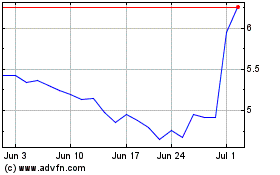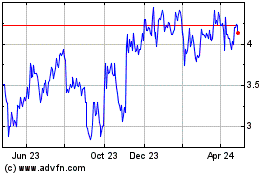Consumers Reach for Their Coupon Book
March 25 2009 - 8:30AM
Business Wire
When the nation�s economic woes hit home, coupons sent by mail
are one way to overcome financial strains, says a recent study by
Pitney Bowes (NYSE: PBI) and DM News. Not only are consumers
looking for free money vouchers in their daily mail delivery,
they�re most likely to use coupons on groceries, entertainment and
performances. In general, consumers expect a 10 to 25 percent
discount for coupons sent by mail, but this varies depending on
which U.S. city they live in.
�In times such as these, coupons sent by mail are an effective
way to relieve pressure on a household budget,� said Leslie
Abi-Karam, executive vice president and president, mailing
solutions management, Pitney Bowes Inc. �The research clearly shows
that consumers have come to depend on the cost savings associated
with coupons sent by mail.�
On the east coast, grocery coupons are wildly popular in Boston,
where 95 percent of residents use coupons to put food on the table.
Nearly half of Bostonians expect a 10 percent discount on
groceries, but they have higher expectations for discretionary
purchases like electronics or travel, where they anticipate a 25
percent discount.
Seventy percent of residents in culture-rich New York City are
more likely to redeem a coupon for entertainment and performances
while these subway- and cab-hoppers are the least likely to redeem
one for auto parts and services. High expectations abound on
discounts for entertainment and performances in the Big Apple,
where one-quarter of consumers expect more than 25 percent off for
a show ticket.
It�s not the same on the west coast, where most residents (43%)
in L.A. expect only a 10 percent discount on entertainment and
performances. When they do redeem coupons, most residents (49%) in
the �City of Angels� are least likely to use them on travel and
most likely (84%) to use them on groceries.
�The rising cost of food and utility prices in today�s economy
is influencing spending. If marketers can pinpoint select groups of
people with which to target financial promotional deals, and they
get buy-in, it�s a win-win,� said Robin Coulter, department head
and a professor of marketing at the University of Connecticut
School of Business.
Among the survey�s other findings:
- Miami (66%), New York (64%), and
Denver (64%) residents are most likely to use coupons on health and
wellness products; while residents in Houston (48%), Boston (52%)
and Seattle (54%)�not so much.
- Travel doesn�t top the list as
something to use a coupon on in L.A. (49%), Seattle (52%) or
Chicago (55%), but it does in New York (68%), Denver (65%), and
Atlanta (61%).
- Residents in Atlanta (64%),
Denver (64%), Miami (64%) and Phoenix (63%) are most likely to clip
their coupons for auto parts and services as opposed to residents
in New York (42%), Boston (49%) and Seattle (48%).
About Pitney Bowes:
Pitney Bowes is a mailstream technology company that helps
organizations manage the flow of information, mail, documents and
packages. Our 35,000 employees deliver technology, service and
innovation to more than two million customers worldwide. The
company was founded in 1920 and annual revenues now total $6.3
billion. More information is available at www.pb.com.
Pitney Bowes (NYSE:PBI)
Historical Stock Chart
From Jun 2024 to Jul 2024

Pitney Bowes (NYSE:PBI)
Historical Stock Chart
From Jul 2023 to Jul 2024
